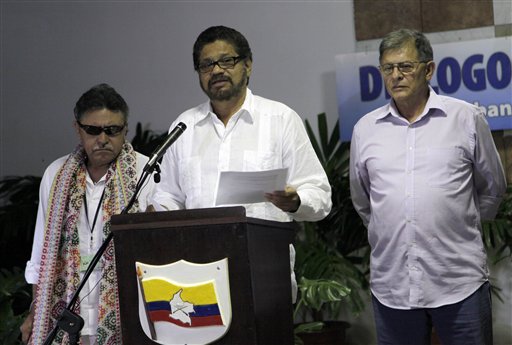Colombia rebels, govt reach agreement on drugs

Ivan Marquez, center, chief negotiator for the Revolutionary Armed Forces of Colombia (FARC) speaks to journalists accompanied by fellow rebels Jesus Santrich, left, and Ricardo Tellez at the close of a round of peace talks with Colombia’s government in Havana, Cuba, Sunday, May. 4, 2014. According to a joint statement, the rebels and Colombian authorities did not sign a final agreement, but made partial progress on the issue of the fight against drug trafficking. AP
HAVANA — Colombia’s government and main rebel group on Friday announced an agreement to jointly combat illicit drugs in the South American country, which was long the world’s leading cocaine producer.
Under the accord, the Revolutionary Armed Forces of Colombia, known as the FARC, agreed to divorce itself completely from the drug trade.
DEA and Colombian authorities have said that some FARC fronts are involved in the production and sales of drugs to Mexican and Colombian traffickers and through Venezuelan intermediaries. In the past, the FARC had denied any involvement in trafficking, claiming it only taxes producers. Peru recently overtook Colombia in cultivation of coca, the crop used to produce cocaine.
“What we have agreed upon recognizes that in order to set the bases for a stable and lasting peace in Colombia it is necessary to find a definitive solution to the problem of illicit drugs,” said statement from the talks read at a news conference in Havana.
It was the latest agreement reached during months of talks in the Cuban capital. The two sides earlier reached accords on agrarian reform and the political participation for the FARC, but none of them will take effect until all items on the agenda for negotiations are settled. The FARC is the Western Hemisphere’s last remaining major leftist insurgency, having taken up arms a half century ago.
Article continues after this advertisementThe announcement comes a little more than a week before elections in Colombia, involving incumbent President Juan Manuel Santos, who launched the peace talks, and his main challenger, Oscar Ivan Zuluaga, who opposes them. Zuluaga, a protege of former President Alvaro Uribe, argues that the FARC needs to end hostilities for talks to continue and should not be permitted into national politics.
Article continues after this advertisementEarlier in the day, the FARC and Colombia’s other main rebel group, the National Liberation Army, issued an unusual joint statement declaring a halt in fighting for eight days, from May 20-28, around Colombia’s May 25 presidential election.
Rebels have tried to disrupt past presidential elections and often dismiss Colombia’s electoral politics as a sport dominated by the country’s elites, so the cease-fire appears to be a vote of confidence in the Havana-based peace talks launched in November 2012 by Santos. The FARC also declared a cease-fire during March legislative elections.
Santos, who is seeking re-election, has been under attack from his main rivals for breaking with the policy of Uribe, whose relentless, U.S.-backed military pressure had seriously weakened the guerrilla forces.
Conservative Party candidate Marta Lucia Ramirez said the rebel announcement “is a cease-fire in which the FARC joins the presidential campaign” of Santos.
Zuluaga, running second behind Santos in most polls, said that “the halt to criminal actions should be indefinite and verifiable.”
But the action was welcomed by pro-Santos Sen. Roy Barreras, who said it “is a clear message Colombians that peace is close and is possible.”
The rebels have declared temporary cease-fires in the past, though they have not been fully honored. The government itself has refused to grant cease-fires to the rebels during the talks.
Both of Colombia’s rebel groups formed in the 1960s as an outgrowth of rural movements that sought a more equitable distribution of land.
The FARC is the hemisphere’s largest active guerrilla army, with about 8,000 members still in arms. The National Liberation Army, which has about 2,000 fighters, is not taking part in the Havana talks, though it has expressed a desire for negotiations with the government.
Meanwhile, four presumed members of the FARC died in an explosion, apparently while mishandling explosives, according to Patricia Velez, mayor of the town of Planadas, where the blast occurred. She said the dead included three adults and one minor.
RELATED STORIES
Australia, Colombia smash international drug ring